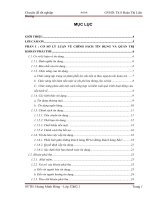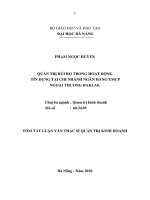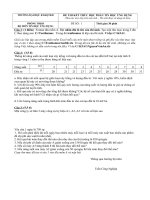past perfect tense thì quá khứ hoàn thành past perfect tense thì quá khứ hoàn thành i use cách dùng past perfect tense được dùng để diễn tả 1 một hành động xảy ra trước một thời điểm xác định t
Bạn đang xem bản rút gọn của tài liệu. Xem và tải ngay bản đầy đủ của tài liệu tại đây (148.58 KB, 3 trang )
<span class='text_page_counter'>(1)</span><div class='page_container' data-page=1>
<b>PAST PERFECT TENSE (THÌ Q KHỨ HỒN THÀNH)</b>
<b>I/ Use (Cách dùng)</b>
Past Perfect Tense được dùng để diễn tả:
<i>1.</i> Một hành động xảy ra trước một thời điểm xác định trong quá khứ.
EX: John had traveled to England before 2000.
<i>2.</i> Một hành động xảy ra trước một hành động khác trong quá khứ.
S1 + Past Perfect + before + S2 + Simple Past
<b>EX: George had seen this movie before he went to bed last night.</b>
S1 + Simple Past + after + S2 + Past Perfect
<b>EX: George went to bed after he had seen this movie last night.</b>
S1 + Past Perfect + when + S2 + Simple Past
<b>EX: When I came back home yesterday, my friend had already been there.</b>
<b>II/ Form (cấu tạo)</b>
<b>1. Affirmative (Khẳng định)</b>
<b> </b>
<b>EX: Mr. Minh had visited England before last year.</b>
<b>2. Negative (Phủ định)</b>
<b>EX: Mr. Minh hadn’t visited England before last year.</b>
<b>3. Question (Nghi vấn)</b>
<b>EX : Had Mr. Minh visited England before last year? – Yes, he had/ No, he hadn’t.</b>
<b>Các trạng từ đi kèm với thì QKHT:</b>
<b>- before/by + thời gian trong quá khứ.</b>
<b>EX: I had left high school by last June.</b>
<b>- before/ by the time + QKĐ, QKHT.</b>
<b>EX: </b>They <b>had just left</b> by the time we <b>arrived</b> home.
- after + QKHT, QKĐ.
<b>EX: After </b>the girl <b>had gone</b> out, her mother <b>called</b> her.
<b>EXERCISES: Chia thì Q khứ hồn thành</b>
<i>1.</i> They <i>went</i> home <i>after</i> they (finish) ………. their work.
<i>2.</i> She <i>said</i> that she (already, see) ………. …. Dr. Rice.
<i>3.</i> When we <i>came</i> to the stadium, the match (already, begin) ………..
<i>4.</i> They <i>told </i>me they (not, eat) ………. such kind of food before.
<i>5.</i> He <i>asked</i> why we (come) ………. so early.
<i>6. After</i> they (go) ………., I <i>sat</i> down and <i>rested</i>.
<i>7.</i> Before she <i>watched </i>TV, she (do) ………. her homework.
<i>8.</i> It <i>was </i>the first time I (ever, see) ………. such a beautiful girl.
<i>9.</i> We (move) ………. To BMT City <i>by 1990.</i>
<i>10. By the time</i> we <i>got</i> there, the play (start) ………. already.
<i>11. Before</i> going to bed, the man (turn) ………. off all the lights.
<b>S + had + P.P (V3/ VED) + O</b>
<b>S + had + not + P. P + O</b>
</div>
<span class='text_page_counter'>(2)</span><div class='page_container' data-page=2>
<i>12.</i>A stranger (wait) ……….for him when he <i>came</i> back home <i>yesterday</i>.
<b>Past Perfect and Past simple </b>
1. We (see) ………... that film <i>before 1975</i>.
2. When I (come) ………... to the room <i>last night</i>, this film (begin) ………... <i>a quarter before</i>.
3. …….…. Ronald Regan (be)…………...a Hollywood actor <i>before</i> he (become) ...a politician?
4. I (feel) ………... little better <i>after</i> I (take) ………... the medicine.
5. Was Tom at the party <i>when</i> you (arrive) …………...? – No, he (go) ………... home.
6. Anna (never, see) ………...snow <i>until last winter</i>.
7. He (live) ………... in his father’s house till his father <i>died</i>.
8. What <i>did</i> you <i>doafter</i> you (leave) ………... the stadium?
9. <i>In the 1980</i> Olympic Games, the Soviet people (complete) ………... their preparations <i>when</i>
the participants (arrive) ………...
10. <i>When</i> he (come) ..., the children (already, finish) ...the exercises.
11. <i>By the time</i> he (arrive) ………., the match (begin) ...
12. When the telephone <i>rang</i>, I (just, finish) …………... my homework.
13. Peter’s father (repair) ………... his old bicycle <i>this morning.</i>
14. <i>When</i> we (come) ... Tom (have) ………...dinner already
15. <i>After </i>she (finish) ...her work, she (leave) ...the office.
16. <i>As soon as</i> it (stop) ...raining, the workers <i>went</i> on with their work.
17. What ……… he (do) …… <i>after</i> he (leave) ... school?
18. <i>Before I</i> (come) ...here yesterday, my mother (call) ………. me.
19. We <i>were</i> very tired <i>last night</i> because we (play) …...football in the afternoon.
20. Linda wasn’t at home then, maybe she (go) ……… out.
21. I (meet) ... him twice <i>before</i> I (leave) ... for London.
22. <i>When</i> we (come) ... to the movies, the film (already, begin) ...
23. <i>After </i>I (finish) ... my breakfast, I (get) ... ready to go to school.
24. <i>By 2007</i>, I (leave) ... high school.
25. He (leave) ... his office <i>after</i> he (read) ... the report.
26. He (go) ... to the railway station <i>yesterday morning</i> but the the train (start) ...
27. The manager (already, leave) ... for the conference <i>before</i> we (get) …...to the office.
28. This worker (not, finish) ... his work <i>before</i> he (go) ... home.
29. I didn’t meet Sleve because when I (arrive) ..., he (go) ...to school.
30. ... you (live) ... in Hanoi <i>before</i> you (move) ... to here?
31. I (go) ... to bed <i>before 9 p.m last night</i>.
32. Miss Snow (type) ... ten letters <i>before</i> lunchtime yesterday.
33. The train (start) ... <i>before</i> we (arrive) ... at the station.
34. The film (begin) ... <i>when</i> we (get) ... to the cinema.
35. He <i>said</i> that he (see) ... that man before.
36. Mr. Brown (die) ... ...<i>after</i> he (be) ... ill for a long time.
37. <i>By December 1st<sub> last year</sub></i><sub>, he (work) </sub><sub>... </sub><sub>in the bank for 5 years.</sub>
38. He <i>discovered</i> that he (eat) ... a fly.
39. He (do) ... nothing <i>before</i> he (see) …...me.
40. I <i>realised</i> that I (see) ... that woman before.
41. Where ………… you (go) ………. <i>yesterday</i>? – I (go) ... to see one of my friends.
42. Peter (have) ... dinner <i>before</i> he (do) ………. his homework.
43. These students (take) ... an exam <i>before</i> they (have) ... a summer
holiday last year.
44. They <i>got</i> up late, and when they (arrive) ...at the staion, the train (leave) ………...
45. <i>After</i> getting up, the boy (brush)... his teeth and (have) ... breakfast.
46. <i>When</i> I (get) ...home, she (be) ...there for three hours.
47. We <i>tried</i> to phone Henry this afternoon, but there (be) ...no answer. He (go) ...out.
48. They <i>arrived</i> at work in the morning and <i>found</i> that somebody (break) ...into the office
during the night. So they (call) ...the police.
</div>
<span class='text_page_counter'>(3)</span><div class='page_container' data-page=3></div>
<!--links-->









